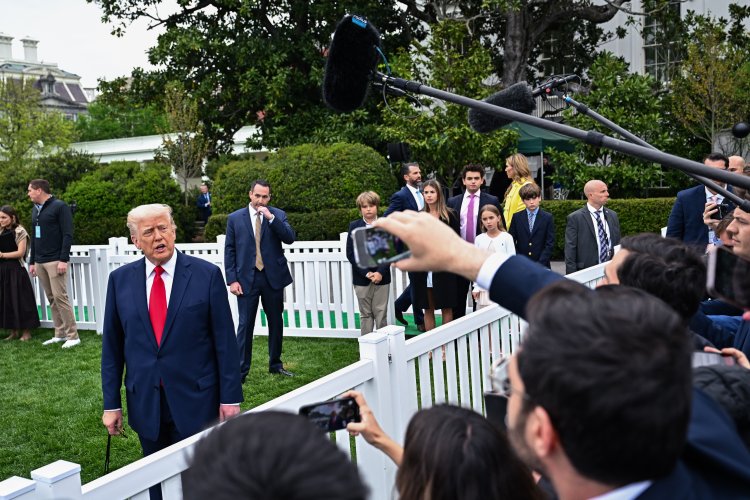White House ‘close’ to tariff agreements with Japan, India, likely to lack detailed specifics
According to an individual connected to the White House, the process of finalizing deals “may take months to hammer out.”

In lieu of comprehensive trade deals, administration officials are aiming to finalize what three individuals familiar with internal discussions referred to as “memorandums of understanding” or a broad “architecture” for future agreements. These sources were granted anonymity to speak on the matter.
“It may take months to hammer out the final deals,” acknowledged one individual, while stating, “these things are complicated.”
This represents the clearest indication yet of how President Donald Trump and his senior economic advisors intend to approach the daunting task of negotiating individual agreements with over 60 trading partners to circumvent the steep tariffs the president has threatened for early July. It also reflects an understanding within the White House of the urgent need to reassure businesses and the financial markets that a resolution to the ongoing trade wars, which have caused considerable disruption to the global economy, is on the horizon.
Vice President JD Vance suggested such a strategy in a speech delivered in Jaipur, India, on Tuesday, mentioning that Washington and New Delhi are “hard at work on a trade agreement” and noting that he and Indian Prime Minister Narendra Modi “made very good progress” during their Monday meeting. The vice president’s office confirmed on Monday that the U.S. and India had finalized the “terms of reference” for negotiations but refrained from providing further details.
It remains uncertain whether announcing these frameworks for future agreements will be effective in calming market concerns and mitigating political backlash amid ongoing economic instability.
"I wouldn’t even call them deals,” another individual familiar with the discussions remarked about the frameworks being pursued by the administration. “Basically, [it’s] an agreement that we would like to talk about doing a deal.”
"They're going to start rolling out a bunch of stuff that just says, you know, we're signing something that says we're going to start talks,” they added.
A White House spokesperson directed inquiries concerning a trade agreement with India to the vice president’s comments from Tuesday and did not provide further comments regarding negotiations with Japan.
A representative from the Indian embassy pointed to the country’s statement from Monday, which noted “significant progress” in negotiations, but did not offer more specifics.
Meanwhile, a spokesperson for the Japanese embassy declined to comment. However, recent statements from the Japanese government indicate a reluctance to expedite a trade deal with the U.S., despite Trump's recent meeting with one of their top trade advisors.
“We do not intend to make one compromise after another to conclude negotiations swiftly," Prime Minister Shigeru Ishiba said in parliament last week, according to reports from regional media. Additional meetings are scheduled for this month.
On April 2, Trump announced “reciprocal tariffs” as high as 50 percent on over 50 countries and the 27-member European Union — an action promoted by the White House as “Liberation Day” — marking the most significant U.S. protectionist measures since the 1930s. The president contends that these tariffs are crucial to correcting decades of trade imbalances and revitalizing the U.S. manufacturing sector, although the announcement bewildered political leaders both domestically and internationally, leading to a sharp decline in financial markets.
In response to escalating warnings of economic downturns, Trump declared a 90-day pause on heightened tariffs for most countries on April 9, just one day after their implementation, while extending tariffs on Chinese goods to a total of 145 percent. Although this pause eased immediate panic, economic uncertainty persisted. Some economists have suggested that the U.S. may still be on a path toward recession, and consumer confidence has plummeted in recent months.
With markets remaining anxious amid ongoing tariff uncertainties and Trump’s threats to dismiss Federal Reserve Chair Jerome Powell, the White House is feeling the pressure to demonstrate concrete progress on trade agreements. The Dow Jones Industrial Average fell nearly 1,000 points on Monday, setting it up for its worst April performance since 1932.
"There's a range of economic indicators putting pressure on the market, and business leaders and investors are looking for signs of progress,” remarked Kevin Madden, a senior partner at Penta Group, a business consultancy. “Congressional allies want to be able to point to some broad frameworks being agreed to. At the very least it helps provide some momentum, as well as some political breathing room, for the current policy approach.”
However, Wendy Cutler, a former negotiator in the U.S. Trade Representative’s office and vice president of the Asia Society Policy Institute, cautioned that a rapid pace in negotiations may lead to agreements that lack depth and durability.
"If the president thinks we have a lot of leverage with these tariffs, why not take the time and really think through our asks to these countries so we can conclude meaningful agreements that will be durable and continue to govern the trade and investment relationship for the years ahead, versus maybe one-off agreements that may be more transactional in nature?” Cutler questioned.
Sources informed about the discussions with India and Japan mentioned that the anticipated agreements will likely be structured to portray the United States as the countries’ principal trading partner, rather than China. However, one insider warned that the language would purposefully contain a significant degree of ambiguity.
Any agreement that pressures China's Asian neighbors to limit trade with its regional allies could face considerable backlash. Both India and Japan maintain strong economic ties with China and are experiencing intensified pressure from Beijing not to make substantial concessions to Washington.
On Monday, China's Commerce Ministry issued a statement asserting, “China is firmly opposed to any party striking a deal at the expense of the Chinese side,” likening negotiations with the U.S. to bargaining with a tiger for its skin, stating that it is “ultimately counterproductive and detrimental to others as well as to oneself.”
James del Carmen for TROIB News
Find more stories on Business, Economy and Finance in TROIB business












